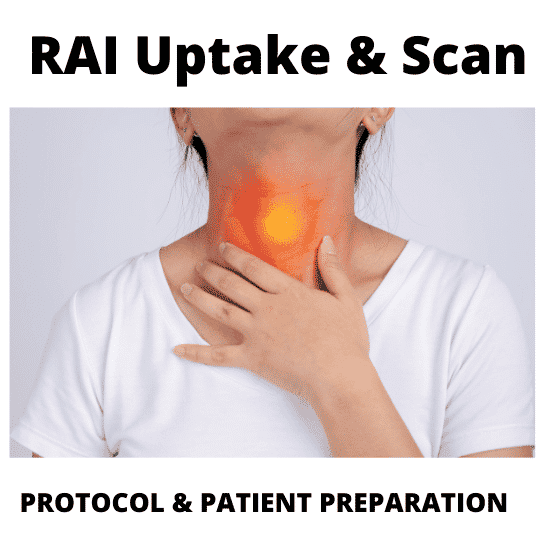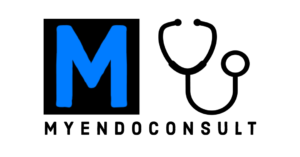Radioactive iodine uptake and scan for the thyroid is a test that measures the amount of radioactive iodine absorbed by the thyroid gland. It is used in the diagnosis of thyroid cancer and other disorders of the thyroid gland.

Indications and Contraindications
- Thyroid imaging is useful in, but not limited to the evaluation of:
- Size and location of thyroid tissue.
- Productive or Destructive hyperthyroidism.
- Suspected focal (i.e., masses) or diffuse thyroid disease.
- The risk for thyroid neoplasm (e.g., post neck irradiation).
Thyroid uptake is also useful for:
- Distinguishing between productive hyperthyroidism from other forms of thyrotoxicosis (e.g., thyroiditis and thyrotoxicosis factitia).
- Estimating the dose of iodine-131 to be administered for patients undergoing treatment for hyperthyroidism
Examination Time (2 day test)(estimated time to complete exam)
- Initially – 20 minutes for radiopharmaceutical administration. (Day 1)
- Optional 4 hour uptake – 15 minutes (Day 1)
- Imaging and uptake at 24 hours – 1 hour. (Day 2)
Patient Preparation
The patient must be off thyroid hormones per physician direction as follows.
(1) Thyroxine (T4) for at least 1 month. Levothyroxine (Synthroid). * Thyroid cancer risk stratification
(2) Triiodothyronine (T3) for at least 10 days. Liothyronine sodium (Cytomel). * Thyroid cancer risk stratification
The patient must not be taking anti-thyroid medications.
(1) Propylthiouracil (PTU) and methimazole (Tapazole) for at least 10 days.
The patient must not have been exposed to intravenous or intrathecal iodinated contrast material (IVP, CT with contrast, myelogram angiogram) for at least 1 month (non-ionic) before the RAIU scan.
Equipment and Energy Windows
Gamma Camera: 1 large field of view
Capintec probe—measures thyroid function
- Collimator – pinhole with 5 millimeter insert
- Energy Window: 20% window centered at 159 kiloelectron volt (kev)
Radiopharmaceutical Dose and Technique of Administration.
| Study (Protocol Category) | Prescribed (Rx) Dose | Administered Dose Range +/- 10% | Radiopharmaceutical | Method of Administration |
| I-123 Uptake and Scan | 200 microcurie (uCi) | 180 uCi to 220 uCi | Sodium Iodide I-123 | Oral |
Patient Position and Imaging Field
- Patient Position: Supine
- Image Field: neck
Acquisition Protocol
- Uptake portion to determine thyroid function is done at an optional of four hours if requested by physician after ingestion of capsules and always done at 24 hours post ingestion also. Print out computer results of uptake percentage.
- Begin imaging with gamma camera 24 hours after ingestion of the radiopharmaceutical.
- Select patient name and make sure protocol is called I-123 Uptake and Scan and the accession number is correct.
- Acquire a 10 – minute Anterior Marker image of the thyroid with the collimator 6 centimeters (cm) from the patient’s neck (a 5 cm long block can be made as a convenient measuring device). Markers (source I-123 capsule) should be placed in the field of view to calibrate the image for size (at sternal notch and 5 cm to the right).
- Acquire a second 10 – minute Anterior image with the distance between the collimator and patient’s neck is then adjusted so that the thyroid gland fills three quarters of the field of view.
- Acquisition of 10 – minute “RAO” and “LAO” oblique images at 35 degrees and again with the thyroid gland filling approximately three-quarters of the field of view.
Physical Half-Life = 13.2 hours
Radiation Mean % per disintegration Mean energy (keV)
Gamma-2 83.3 159.0
Ce-K, gamma-2 13.6 127.2
Patient instructions for a RAIU scan
How do I get ready for the test?
You should be off all thyroid medication six weeks before your
appointment. You should not have a CT Scan with any contrast or x-ray dye for six weeks before your procedure.
Women who are pregnant or breast-feeding should not have this test done.
How is this test done?
This is a two-day procedure.
First day
On your first day, the nuclear medicine technologist will give you two pills that contain a small amount of radioactive iodine. This iodine will travel to your thyroid over the next 24 hours. You will not feel any different from these capsules. The first day you are here for about 15 minutes.
What to avoid
The only restriction you will have over the next 24 hours is to avoid certain foods that contain extra iodine. Examples are seafood, strawberries, white bread, and foods with large amounts of extra salt.
Second day
When you return the next day we will take pictures of your thyroid. You will be asked to lie on your back on our imaging table. We will take four pictures of your thyroid, each taking about 10 minutes. You will be asked to lie very still as this is important in getting quality images. The second day will take about one hour.
What can I expect after the procedure?
There should be no ill effects during or after the exam. The dose of radioactive material you will receive is very small.
When do I hear the results?
After reading your nuclear medicine scan, the radiologist will give a report to your doctor. Your doctor will discuss the results with you by phone, by letter or at the time of your next office visit.
Questions?
Call your doctor if you have questions about your medicines.
References
- Society of Nuclear Medicine (SNM) Procedure Guideline for Thyroid Scintigraphy 3.0,Balon, September,2006.
- Image Wisely Radiation Safety Clinical Aspects of General Nuclear Medicine, Administered Activity and Patient Radiation Exposure, Becker, Nov 2012
- Pediatric Radiopharmaceutical Administered Doses: 2010 North American Consensus Guidelines, Gelfand, Feb, 2011 JMNM
- United States Nuclear Regulatory Commission US NRC 10 CFR 35.63Textbook of Nuclear Medicine, Wilson, 1997.
Kindly Let Us Know If This Was helpful? Thank You!


